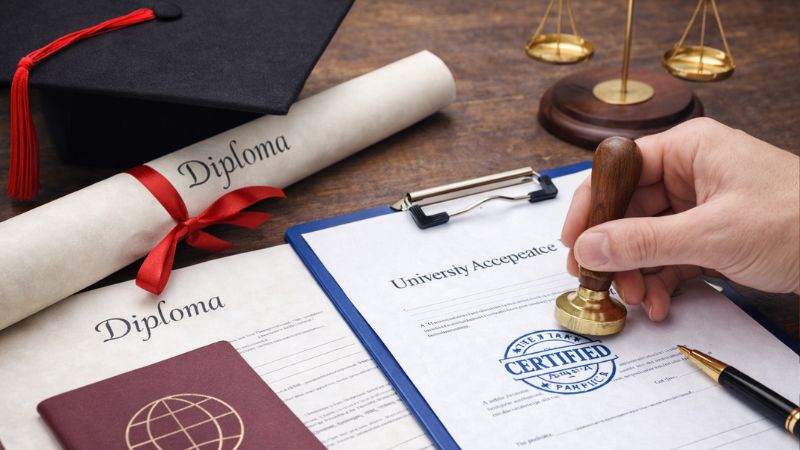When you plan to continue your studies abroad, you may need to notarise your diploma in Singapore before it is accepted by your new school. However, many students leaving their home countries for continued education abroad are easily confused about what they should be doing about authenticating their various documents. Here we explain why schools require notarised documents, clarify the difference between notarising, apostilling, and certification, and answer the question on how to notarise your educational documents in Singapore.
Key Takeaways
- If you plan to continue your education abroad, you may need your educational documents notarised.
- It’s always best to check the exact requirements about which documents should be authenticated directly with your educational institution.
- In Singapore, notarising educational documents is followed by apostilling the Notarial Certificate through the Singapore Academy of Law.
- If your new school is located in a country that is not a member of the Hague Convention, you will also need to legalise your documents with the embassy or consulate.
Why Do Schools Abroad Require Notarised Documents?
When you apply for admission to study abroad, the school you apply to will want to have proof that your documents are genuine and confirmed by an authority. Having your educational documents certified for an overseas university by a notary confirms that your diploma and transcript are valid. Without notarisation, a foreign school may turn back your educational documents and delay or decline your application.
Which Educational Documents Need Notarisation?
Most educational institutions specify the list of requirements for international students, including student visas or document notarisation, on their websites. Typically, the list of requirements for study abroad and document certification in Singapore can include notarisation of:
- Degree certificates showing your academic achievements,
- Academic transcripts listing your courses and credits earned,
- Recommendation letters from your educational instructors,
- Financial documents serving as proof of your finances,
- Copies of your passport and ID.
Understand Different Types of Document Authentication
If you are not familiar with the legal process in Singapore, you might have questions about the differences between document certification, notarisation, apostilling, and legalisation. Here is the breakdown of these terms to avoid confusion and ensure you follow the right process when you prepare your university applications and visa paperwork.
Certification
When you meet a Notary Public for overseas study document certification, they will check the original documents, take a copy, compare it with the original, and attach a notary certificate, confirming it as a true and genuine copy.
Notarisation
Notarisation of an educational document in Singapore includes verifying your identity, certification by attaching a Notarial Certificate, and submission of the document to the Singapore Academy of Law for final authentication. This is a standard step in notarising Singapore academic documents for overseas use.
Apostille
After notarisation, the Singapore Academy of Law affixes an apostille certificate to the Notarial Certificate accompanying the notarised educational document. In general, overseas education institutions in countries that are members of the Hague Convention accept documents notarised in Singapore and apostilled.
Legalisation
If your school abroad is located in a country that is not a member of the Hague Convention, you will need full legalisation of your educational documents. This includes notarisation of the documents with the Notary Public, authentication by SAL, verification by the Ministry of Foreign Affairs of Singapore, and final legalisation by the embassy or consulate of the country where your school is located.
How to Get Your Documents Notarised for Overseas Study
As you prepare your paperwork for studies abroad, you can have your documents notarised with a Notary Public in Singapore. In most cases, you need to go through the following steps:
- Check the requirements for document notarisation with your educational institution.
- Gather the required academic documents and other papers that need to be notarised.
- Make an appointment with the Notary Public.
- Visit the office of the Notary Public and bring your educational documents for notarisation, along with your passport and/or ID.
- Present your documents to the Notary Public.
- The notary will verify your original academic documents, make copies, attach a Notarial Certificate to the copies, and send them for authentication to the Singapore Academy of Law. This process applies when you notarise documents in Singapore for overseas study
- If your educational institution is located in a country that is a member of the Hague Convention, the Singapore Academy of Law will affix an apostille to the Notarial Certificate. You will be able to collect your notarised documents from the Notary after apostilling with the SAL.
- If your overseas school is located in a country that is not a member of the Hague Convention, you will need full legalisation with the Ministry of Foreign Affairs and the embassy or consulate of the country where you will be studying. You can arrange full legalisation through the Notary Public office if they provide this service.
Conclusion
When you seek to continue your education abroad, most often your overseas school will ask you to submit notarised academic documents, authenticated for use outside of Singapore by apostille or by consular legalisation. While you can find out the exact requirements for preparing your paperwork on the website of your educational institution, you will need the assistance of a Notary Public in Singapore for notarisation. If you have questions or need to notarise your education documents in Singapore, please don’t hesitate to contact IRB Law offices for comprehensive notary public services.
FAQs
How much does it cost to notarise and apostille my educational documents in Singapore?
In Singapore, the costs for notarising educational documents are fixed in the Notarial Public Rules as follows:
- Certifying a true copy of the original where seal is required — $10 for the first page and $2 for each subsequent page.
- Issuance of a notarial certificate—$75 per notarised document.
- Authentication by the Singapore Academy of Law—$87.20 per document.
Do I need legalisation of my educational documents by an embassy?
You may need full legalisation of your educational documents by the Ministry of Foreign Affairs and the embassy or consulate, if your school is located in a country that is not a member of the Hague Convention or if this is specifically required by your educational institution. If you need this service, please contact the IRB Law notary team for additional information.
How can I notarise my diploma in Singapore?
You can notarise your degree certificate, your academic transcript, and other documents for overseas study by making an appointment with a Notary Public in Singapore. Please don’t hesitate to contact the IRB Law notary team for any questions, as well as for notarising your educational documents in Singapore, apostille authentication, or full legalisation.




